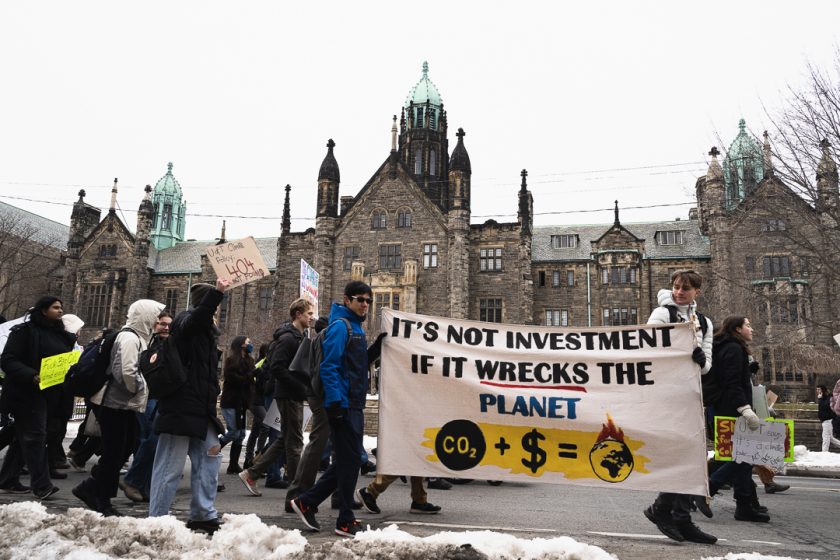Can institutions be re-designed to maintain and strengthen care? Can recognizing and valuing caregiving enhance solidarity and resilience in youth groups to sustain climate advocacy?
Commoning and climate justice
The Greater Toronto Area (GTA) in Canada is bustling with youth-based climate action and advocacy. From bringing lawsuits against governments to advocating for fossil fuel divestment and spreading awareness about intersecting crises such as housing insecurity and climate impacts, young people are emerging as powerful voices in the climate justice movement. Driven by heightened awareness and frustration with government inaction and systemic inequalities, young people prioritize intersectionality to address environmental issues alongside social justice, economic inequality, and human rights. Through collective action, protests, and participation in decision-making, they foster communities and create new norms centered on shared values and care, a process known as “commoning.” [1]
The verb “commoning” is distinct from the noun “commons” that are traditionally understood as resources such as land, irrigation systems, forests, pastures, and catchment areas jointly held with formal or informal systems of property rights and enforced governance. Nobel laureate Elinor Ostrom highlighted the importance of communication, trust, and institutions for conserving these commons. However, historian Peter Linebaugh argues that focusing on commoning rather than the management of the commons that is pre-occupied with “getting the institutions right” orients us to the processes of how reciprocity, empathy, affect, and care can sustain collective action[2]. Therefore, in our research we examine the role of care in youth climate advocacy groups in the Greater Toronto Area (GTA), working on issues such as campus divestment from fossil fuels to spreading awareness about local civic engagement.
An Ethic of Care for Commoning
Political theorists Berenice Fisher and Joan Tronto conceptualize care as an “activity that includes everything we do to maintain, continue, and repair our ‘world’ so that we can live in it as well as possible” (p. 40)[3]. An ethic of care grows from recognizing our interconnectedness with others, prompting us to care. The Oxford English Dictionary defines care as “the provision of what is necessary for the health, welfare, maintenance, and protection of someone or something”. To care means to “feel concern or interest; attach importance to something”. The word “care” traces its roots to Old English words of care, cereau meaning “sorrow, anxiety, and grief”. From Proto-germanic comes karo meaning lament, grief, and care. Engaging in climate justice advocacy can empower young people by channeling their feelings of hopelessness and grief into constructive action by advocating for change and building supportive networks that foster a sense of care and belonging. As one youth advocate put it, “I find youth-based organizations to be magical. In our generation there’s a feeling that if we don’t do it, no one is going to. There’s fear and anxiety, but [there’s] also hope in this magic of youth-based activism.”

Fisher and Tronto classify the act of care into four unique but interrelated categories: when an individual cares about something or someone, they recognize that care is needed; when an individual cares for something or someone, they accept that they bear partial responsibility for that care and take action; when an individual gives care to something or someone, they aim to physically meet the needs of care; when an individual receives care, they are the object of care and respond to it[4].
Tronto (1993) argues that care does not function in an egalitarian way because the distribution of caring work serves to maintain and to reinforce patterns of subordination. For instance, scholar and feminist-activist Silvia Federici highlights that caregiving for children, the infirm, and elderly, and cleaning is undervalued and usually relegated to women, people of color, and marginalized castes. At the same time, care is also one of the “powers of the weak” since care givers provide an essential support for maintaining and sustaining life. In our research, we analyze the intersection of care with race and gender identity in youth-based climate advocacy groups[5]. This approach provides a deeper understanding of how youth groups foster caring relationships to sustain their advocacy efforts for climate justice.
Care in Youth-led Commoning
Our findings suggest that interviewees care about climate issues, are driven by a sense of urgency, are concerned for their future, and feel the need for systemic change, which serves as a motivating factor for joining youth-based advocacy groups. The act of caring for is practiced largely through check-ins, friendly conversation, and sharing resources. One person mentioned, “I think the biggest way we care for each other is through our communication channels. A lot of members send educational articles to each other… [and] job opportunities.” As many of the members are in post-secondary education or new to the work force, this example demonstrates both the recognition of a need, as well as an act of care.
While we did not find any differences in caring about and caring for across race and gender identity, we found caregiving practices are influenced by racial and gender identities. For instance, White activists may lean towards radical protesting strategies, whereas racialized individuals and first-generation immigrants often adopt non-confrontational strategies, fearing systemic repercussions such as deportation. Although White activists acknowledge their position of safety, particularly in high-risk actions, and the importance of leveraging their privilege to challenge oppressive systems, these radical protesting strategies create discomfort for racialized people and first-generation immigrants. As a racialized first-generation immigrant said, “I’m an international student, so protesting inside a building for hours is not the best thing to do”.

Racialized people perform caregiving through emotionally laborious tasks such as advocating for implementing practices that create space for racialized people of color and people from the global South, indicating the uneven power dynamics operating between those who care for and those who caregive. One interviewee expressed frustration,
“People have this want to uplift Black voices and voices from the global South and we really want to do our best to do all these things, but in practice, they don’t. And it’s written in all our constitutions and values and principles documents, but that has taken so much work and so much pushback from me and other racialized students in the group to get them to actually implement what they say they want to do…and it has made it a bit difficult to implement solid change”.
Gender identity also significantly shapes how queer activists approach caregiving. Their own experiences of marginalization drive them to validate others’ identities and contributions, prioritize mental health to avoid burnout and cultivate supportive environments that promote inclusivity and empathy. One queer activist said,
“There was a new member, and I could tell she was feeling very othered. She was also racialized and visibly queer, and I have gone through the exact same thing. I did invite her for dinner at my place, and we started getting coffee on a regular basis, and that was helpful. I guess that’s why I’m here, to make people who have gone through my experience have a better experience and we are really good friends now and hang out quite often”.
Finally, care receiving centers around feelings of being in a community through communal food-sharing, emotional support, and accountability practices that create connection. One interviewee shared how they received care from another member,
“One of my good friends in the organization called me out for something that I said at a meeting recently and she texted me and told me ‘Let’s have a serious talk’. I was anxious and then she called me in and that was such an act of love and an act of fairness. It [the talk] was ‘I care about you, and I want to not be mad at you. And I want to agree with you on things, but you’re making it really difficult by showing up at meetings like that’. That was such an awesome moment of reckoning for me to apologize and address it, but it was just also the fact that she took the energy to think about it and to message me and to meet with me and to talk me through it. That is just the kindest, most respectful thing that someone can do…is to correct you with love”.
Why do caregiving and care receiving matter?
Interviews suggest that the acts of caregiving and care receiving performed by racialized and queer activists are instrumental for creating a sense of belonging and solidarity that sustain advocacy efforts in youth groups. This finding is in line with Joan Tronto’s argument that caregivers provide essential life-sustaining tasks. Furthermore, racialized and queer activists also highlight the critical need for linking climate justice with racial and queer justice. For instance, Black activists focus on systemic racism and the challenges of getting their voices heard in White-dominated spaces, Asian and Latino participants emphasize power imbalances between the global North and global South, and queer activists focus on creating safe spaces. Yet, caregiving roles remain undervalued and under-appreciated, resulting in feelings of marginality. As one interviewee said, “It’s often the racialized members who feel like they’re putting a lot of work into the organization [but they are] not getting that appreciation back”.
Can an ethic of care bring us closer to climate justice?
This study highlights the multifaceted nature of commoning through caring that is shaped by intersecting identities and the diverse experiences of young people. At the same time, even the practice of youth-led commoning that prioritizes intersectionality reproduces and maintains uneven power dynamics by undervaluing caregiving. To better support youth climate action, our research therefore cautions the tendency to romanticize youth-based advocacy and commoning and instead to investigate further how an ethic of care can deepen and strengthen relationships for sustaining climate justice advocacy. Can institutions be re-designed to maintain and strengthen care? More importantly, can recognizing and valuing caregiving enhance solidarity and resilience in youth groups to sustain climate advocacy? As anthropologist Toby Austin Locke writes, “The real tragedy of the commons is the failures of the [environmental] struggle to find means of caring for one another, caring for ourselves, caring for our common worlds[6]”. In the end, what sustains and saves us may be found in the forces that emerge from the care that we give to—and receive from—one another.
Praneeta Mudaliar, Dannia Eyelli Philipp Gutierrez, Lilian Dart, and Celina Mankarios
Mississauga, Toronto, Mississauga, Mississauga
about the writer
Dannia Eyelli Philipp Gutierrez
Dannia is a passionate economist with a master’s in environment and sustainability. With a deep commitment to inclusive and sustainable economics, she has worked in the international organization sector focusing on environmental affairs.
about the writer
Lilian Dart
Lilian Dart is a PhD student in Geography at the University of Toronto, where her research focuses on environmental justice and participation in environmental decision-making within Canada.
about the writer
Celina Mankarios
Celina Mankarios is an award-winning social entrepreneur, non-profit founder, National Youth Ambassador of Canada, Ontario youth policy advisor, Harvard and University of Toronto Research Assistant and was crowned Miss World International Canada for her humanitarian work. Her work focuses on youth mobilization in changemaking, corporate sustainability and the intersectional impacts of diet on people, the planet and animals.
[1] For a background on commoning, see The Future Wave: Youth-led Commoning for Care and Climate Justice, where we write about the different ways that young people undertake commoning.
[2] Linebaugh (2014) Stop, Thief! The Commons, Enclosures, and Resistance, Oakland: PM Press.
[3] Fisher, B., & Tronto, J. (1990). Toward a feminist theory of caring. In E. K. Abel & M. Nelson (Eds.), Circles of Care: Work and Identity in Women’s Lives (pp. 35–62). SUNY Press
[4] Fisher, B., & Tronto, J. (1990). Toward a feminist theory of caring. In E. K. Abel & M. Nelson (Eds.), Circles of Care: Work and Identity in Women’s Lives (pp. 35–62). SUNY Press
[5] Tronto, J. (1993). Moral Boundaries: A Political Argument for an Ethic of Care. Routledge.
[6] Locke (2017) “Affecting Care, Caring for Affect” Presented at the American Anthropological Association in 2017







Leave a Reply